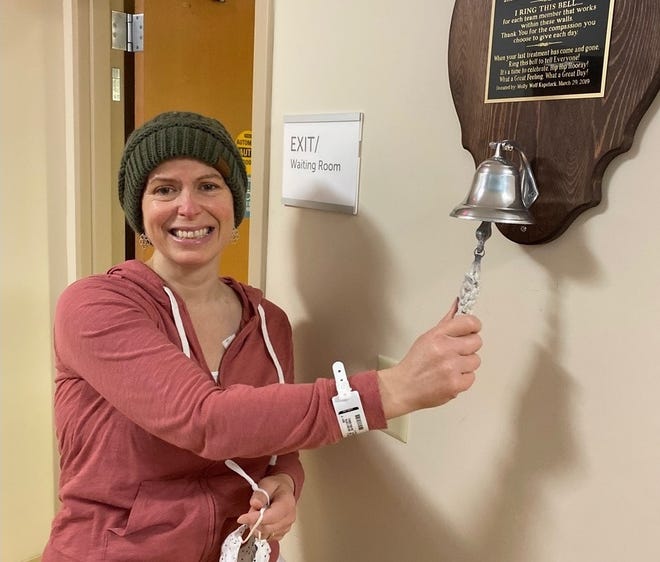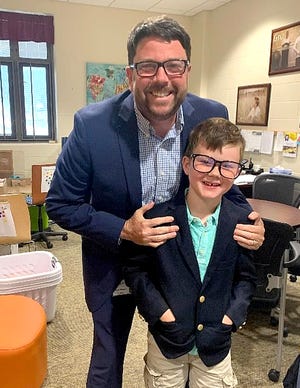

Since she turned 40, Summit County resident Tamara Eggleton made sure to get an X-ray mammogram every year. Despite having dense breasts, each test showed there was nothing of concern.
Last year, Eggleton began feeling unusual breast sensations. She sought out a tomosynthesis – a more advanced, 3-D version of a mammogram – and a breast ultrasound. All turned out negative for signs of cancer.
There was another testing option left: an MRI. But given the results from previous screenings, her doctor told Eggleton insurance wouldn't likely cover it.
"On that day, the years of repeated denials by insurance became my caregiver," said Eggleton. "It was not about my health or what screening test was best for me. It was about the money."
Eggleton, now 47, eventually discovered she already was in an advanced stage of breast cancer after opting for a self-pay fast MRI. The past year has been full of surgeries, chemotherapy, radiation and other treatments.
Such anecdotes have spurred Republicans and Democrats to push for a state law to not only expand insurance coverage of breast screenings, but also increase awareness of the risks dense breasts might pose.
"Until my recent experience, I was not aware that I had better options for the early detection of breast cancer," Eggleton said. "But now I know."
Dense breasts: An obstacle to early detection
Breast cancer affected more than 11,800 women in Ohio in 2018, according to the latest data from the Ohio Department of Health, with Black women dying at higher rates from the disease.
Mammogram screenings are recommended for older women as a way to detect early signs of breast cancer, which in turn increases chances of survival.
However, around 40% of all women have dense breasts due to genetic and environmental factors. Some studies indicate Black women are more likely to have dense breasts. The dense tissue can mask the cancer, making it harder to detect, and the density also increases the risk of cancer.
Tomosynthesis can improve the odds of detecting cancer within dense breasts that regular mammograms typically miss. Some may need further methods like an ultrasound or MRI to find the cancer.
All those extra techniques, however, are useless if women don't seek them out in the first place.
Ohio, like 37 other states, requires notifying patients if their breasts are dense. But the way the law writes out that statement doesn't express enough urgency, said breast cancer survivors.
"I did not realize until I was diagnosed and learned all these things, how vulnerable I really was," said Michele Young, a Cincinnati-area woman whose experience battling breast cancer led to the new bill. "I had been misled as to the extreme nature of my risk, or I would have insisted on a MRI of course, my god."
Currently, the notification only states that dense breast issue "could hide abnormalities" and is "a relatively common condition." It adds that it is not to cause concern but to raise awareness and encourage discussions with the doctor on possible risk factors.
Part of House Bill 371 would alter that text to clarify that dense breasts could make it harder to find cancer on a mammogram and increase risks. It directly prods the patient to look at additional tests.
The hope, ultimately, is that the change in writing would increase the likelihood of finding cancer early for women with dense breasts.
Coverage from health insurance
Seeking out additional tests for breast cancer is one thing; paying for it is another. So HB 371 is hoping to make sure money isn't a reason that women with dense breasts can't get the testing they need.
Right now, the law simply requires that insurers cover one mammogram screening per year or every two years depending on age and risk factors.
The bill would get rid of those factors and offer a blanket one-per-year coverage, and it also specifies that tomosynthesis is included.

"This will allow a patient and her provider to decide when to initiate screening mammograms based on her personal risk factors, removing the barrier of insurance coverage determinations," said Dr.William Farrar, with Ohio State University's cancer center.
Most insurers already offer coverage for tomosynthesis, said Farrar. But because it's not required, coverage isn't guaranteed, so when told that, patients decline it for fear of out-of-pocket costs.
Supplemental screening, like MRIs and ultrasounds, would also be required to be covered for women with dense breast tissue or with a family history of breast cancer. Just 12 states require such coverage in law.
Many insurers already cover such screenings for dense-breast patients deemed "high risk," said Bang Huynh, a radiologist based in Columbus. It's those considered intermediate risk who are currently left out.
But even for high-risk patients, preauthorization is required, said Ann Brown, a radiologist at University of Cincinnati Health. That is still an onerous process, Brown said, and does not guarantee coverage.
Where the bill stands
Mandating extra coverage would cost money. According to a fiscal analysis of the bill, it would likely increase insurance premiums, increasing costs for employers including state and local governments.
But Rep. Jean Schmidt, R-Loveland, who is sponsoring the state bill alongside Rep. Sedrick Denson, D-Cincinnati, thinks there are long-term savings.
"Won't you have a better outcome for the person, for society, and less overall cost if you catch [the cancer] early?" said Schmidt.
The Ohio Association of Health Plans has decided to remain neutral on the bill, potentially removing a roadblock. There isn't a consensus among the plans on how to approach the legislation, said spokesperson Dan Williamson.

Part of the calculus is that at least a few parts of the bill – like tomosynthesis – are already offered by certain plans in some form, meaning the additional costs may not be as high for some insurers.
Ohio's chapter of the National Federation of Independent Business, representing small businesses, is studying that aspect. If it turns out most of the bill is already common practice in the insurance market, the lobbying group won't try to stop the bill as is.
NFIB is worried only small businesses would be seeing premium increases, because big companies tend to use self-insured plans that can't be regulated on the state level, said legislative director Chris Ferruso.
For those who had gone through breast cancer, the bill is an opportunity to help others avoid their same situations.
"We'll be able to save so, so many lives by catching it early," said Young.
Titus Wu is a reporter for the USA TODAY Network Ohio Bureau, which serves the Columbus Dispatch, Cincinnati Enquirer, Akron Beacon Journal and 18 other affiliated news organizations across Ohio.
Source link







